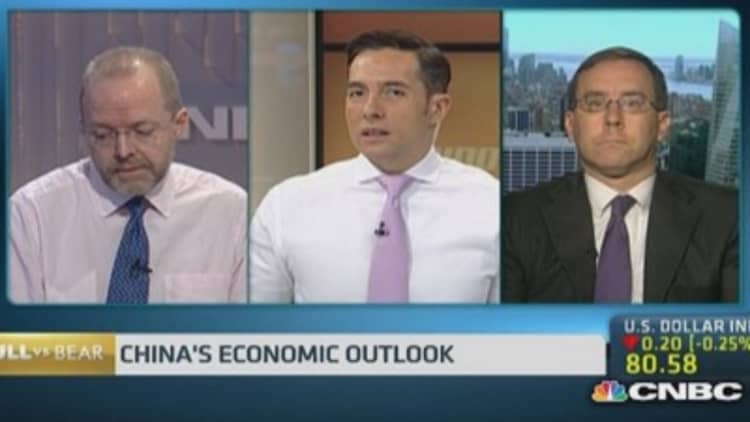As far as market vendor Chang Yu is concerned the golden age of China's economic boom is long past.
"When I arrived [eight years ago], there were so many people you couldn't even walk here," she told CNBC, gesturing toward the empty isle where she sells wigs in Beijing's YaShow market.
Beijing's markets were once the pride of China where the state-supported manufacturing industry supplied the west with a steady stream of goods and lifted millions of people from poverty.
Read MoreRelatives shed assets as China's leader fights graft
These markets thrived in the late 1990's and early 2000's, selling surplus, flawed and copycat items. They were meccas for tourists looking to buy something genuine or close to it for next to nothing. For years, young migrant vendors haggled hard to bring home the bacon.
Now they are in decline. A coy rank of fake eyelashes behind Chang gathers dust. A rack of super hero costumes hangs limp long past Halloween. And she is not alone. Dozens of vendors in Beijing's famous markets who once proudly paraded their wares before celebrities and heads of state told CNBC that business has never been worse.
Rising costs and online alternatives
As China outgrows low-end manufacturing, property values soar and seasoned consumers seek greater convenience and choices online, these markets must evolve or die.
Read MoreRead MoreMobius: Everybody wants a BMW in China
Rising production costs have pushed some foreign companies to move production to less developed Asian countries. Average wages in China's manufacturing sector have risen 96 percent since 2007, according to Thomas Orlik, an economist at Bloomberg Financial and author of Understanding China's Economic Indicators.
"Manufacturers are facing rising costs for labor, rent and electricity and they have passed some of those on to shopkeepers," Orlik said.
And it's not just factories that are paying higher rents. In first-tier cities like Beijing, according to Orlik, real estate prices rose 18 percent in 2013, despite government efforts to curb the property market. A few hundred meters down the road from YaShow, in the trendy Sanlitun neighborhood, a nondescript building housing a department store and luxury apartments recently sold for $928 million dollars.
Read MoreThis asset class maybe the star of the second-half
A vendor at a stall selling Jimmy Joey brand bags in a prime location on the first floor of the Silk Market pays 50,000 renminbi (over $8,000) in monthly rent.
The vendor, who did not give his name, opened an online shop on the e-commerce platform Taobao a few years ago. His online sales now roughly equal those of the Silk Street shop.
"I think the Taobao shop will continue to get better," he said. "Here, [it] will not."
Read MoreMini stimulusworking its magic, China data shows
"Every year it gets worse," said Liu Chao, a sneaker vendor at Silk Street. "We plan to change our business because there are so few people [shopping here] now."
However competition is thick; the anonymous bag seller noted everything is cheaper online, where adept shoppers can choose from hundreds of vendors with similar products.

"If you go online you have to work very hard," said Vanessa Zhang, a senior analyst with Forrester. "You have to receive customers' orders and questions around the clock. You also have to attract steady traffic."
The old fashioned approach
However, Zhang Yong Ping, president of the Silk Street Market Group, is not concerned. From an airy office perched above the hustle and push of the market and looking out upon the glittering towers of Beijing's central business district, Zhang says his model for the future is simple: provide high quality products at the lowest possible prices.
Read MoreChina's May home prices rose at slowest pace this year
"We run our business like it's a market, while we manage our business like it's a luxury mall," Zhang said. "We'll spare no efforts to improve our service and quality. We will also make a better building design and inside decoration. We want to make Silk Street into the first top-grade market in China."
Even as analysts predict that the Chinese online retailer Alibaba may soon become the world's biggest company, Zhang scoffed at the idea that customers would buy high-end goods online.
"All around us are the most luxury malls and the richest men of China, most of Beijing's five-star restaurants and embassies," he said. "Our goal is to make the Silk Street mode spread all over China within two or three years. Maybe it can even reach as far as the American markets."





